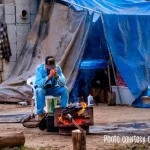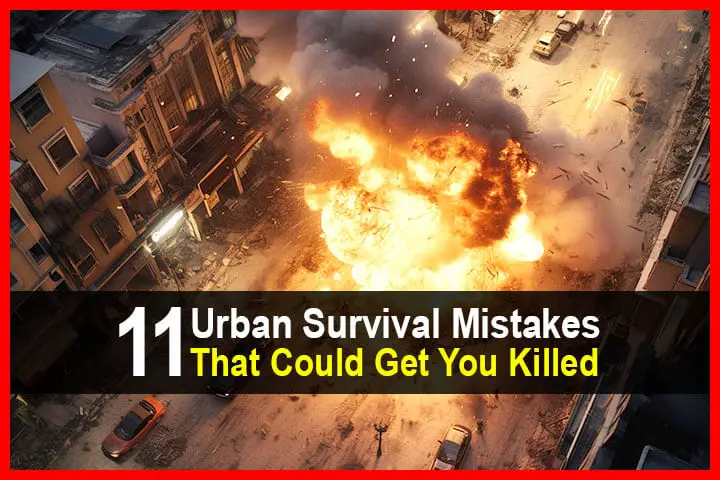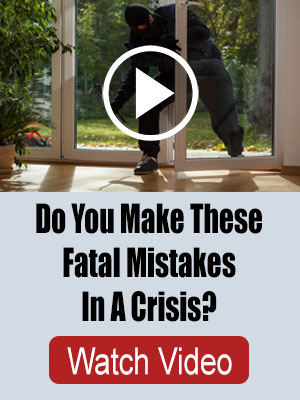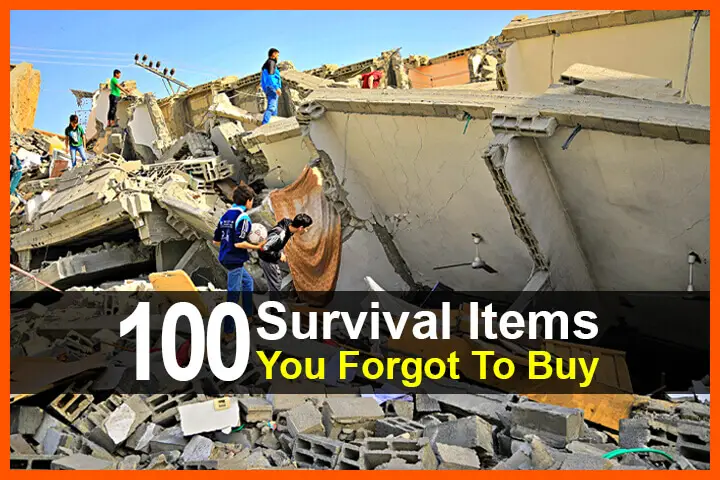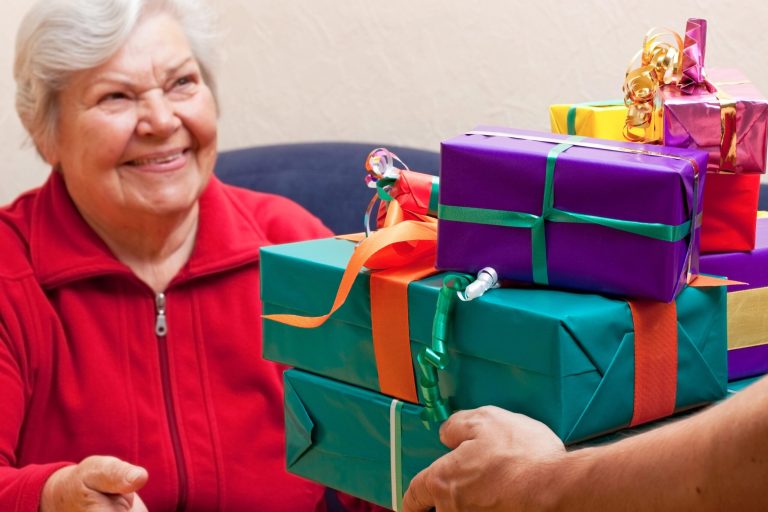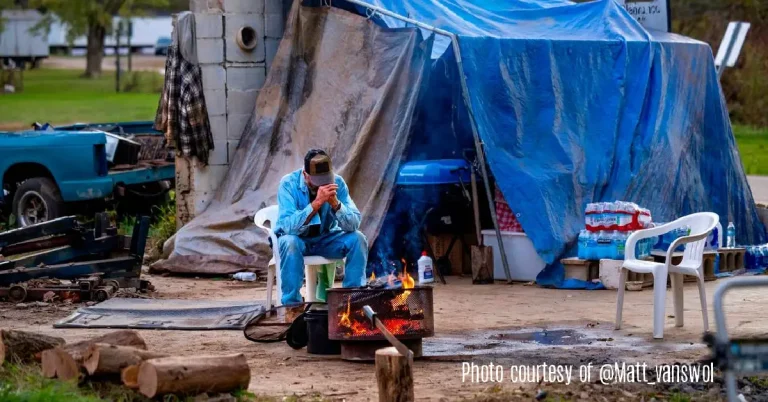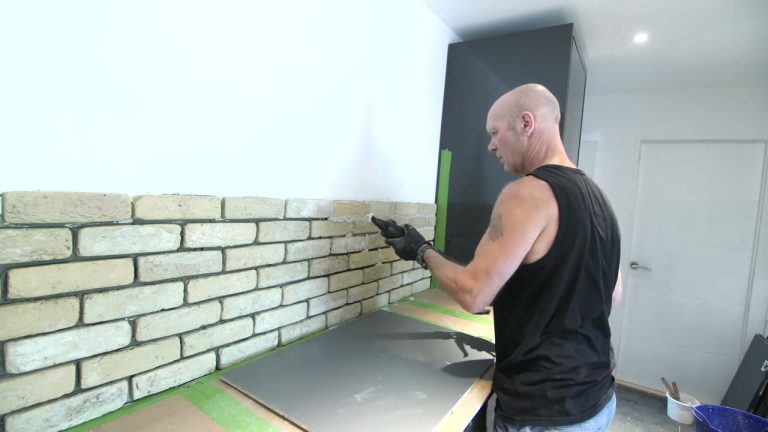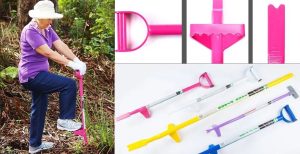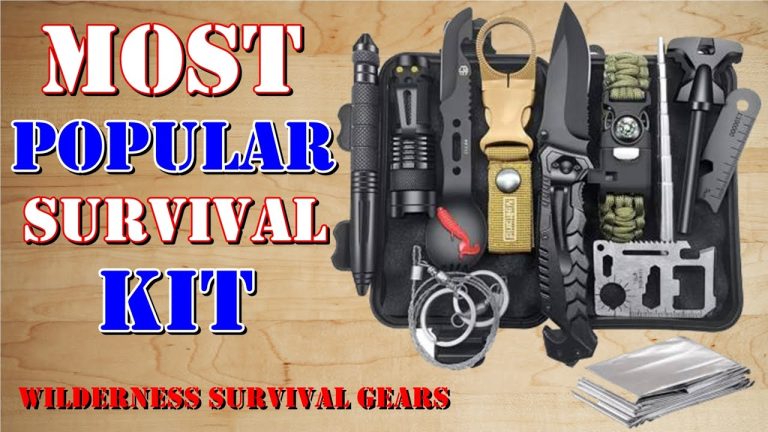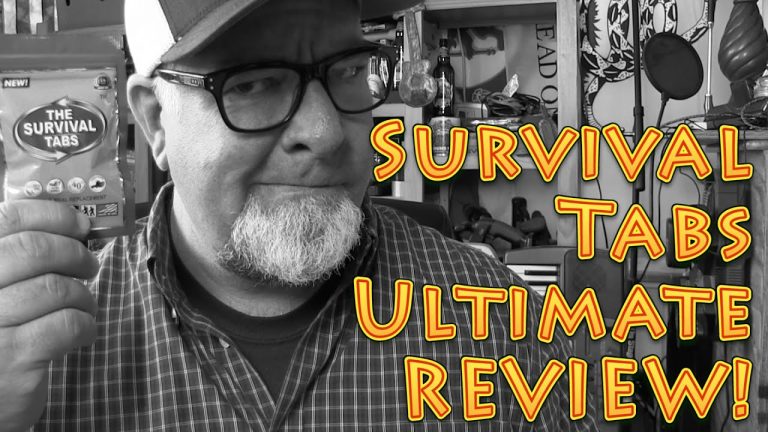Estimated reading time: 10 minutes
Recently, I wrote an article about urban survival skills that could save your life. And when I chose that title, I wasn’t exaggerating. Having those skills during an urban disaster could literally mean the difference between life and death, which is why it’s so important to start practicing them now.
In this article, I want to switch gears and talk about urban survival mistakes that could get you killed. And again, I’m not exaggerating. If you make any of these mistakes, it could cost you your life. So now that you understand how serious this, let’s move on to the list.
Want to save this post for later? Click Here to Pin It On Pinterest!
1. Bragging About Your Stockpile
I know, it’s hard to resist. You spend so much time thinking about preparedness, saving money, looking for great deals, gathering supplies, practicing skills, and so forth, that you’re probably proud of yourself for accomplishing so much—and you should be.
But what do most people do when they’re proud of something? They start telling other people about it, and that’s where you’re liable to get yourself into trouble. When it comes to preparedness, you shouldn’t tell anyone except for those you trust completely.
If you tell the wrong person, then during the next major disaster, someone might say, “Remember such-and-such who said they have lots of food and supplies? Let’s find out where they live.” Hunger can turn people into absolute animals. If they are desperate enough, they’ll do anything to get your food.
In case the wrong person does find out you’re a prepper, here are some things you should do.
2. Not Knowing Your Own City
You know what happens when a disaster is bearing down on a city? Everyone tries to leave at the same time. When that happens, all the highways and interstates leading out of town turn into parking lots. Sitting in your car during a traffic jam is the last place you want to be when a hurricane or something worse is on the way.
While you still have time, get some detailed maps of your town and drive around, getting to know all the shortcuts and backroads. You need to know all the best ways out of town, and you should highlight on your map. If one road is blocked, you need to know if there are any other ways to go.

You also need to identify any potential chokepoints in your town—tunnels, bridges, and particularly busy intersections. Steer clear of these places, even if it means going the long way or going off road . (Speaking of that, make sure you have a bug out vehicle that can do that.)
Also, stay far away from any area where there could be rioting or looting. In places like that, you could get trampled, exposed to teargas, or even arrested. (Here’s what to do if you’re caught in a riot while driving.)
3. Breaking the Law
If you see people breaking through store windows and grabbing everything they can, you might be tempted to grab your share. After all, the owners can just write it off, right? Maybe, but even if the store owner has insurance, someone somewhere has to pay for it. Nothing’s really free.
But ethical issues aside, looting or breaking the law in any way during a disaster could get you killed. You could get trampled in a riot, trapped in a building that’s on fire, or attacked by someone who’s even greedier than you are. Even if there are no police officers around, don’t break the law.
And that includes shooting looters on sight. We’ve all seen those looters will be shot signs, but there are several reasons why this is a bad idea:
- It lets people know you have guns. If they realize this, they might try to sneak in and ambush you.
- If you shoot at looters, they might shoot back. In most cases, it’s simply not worth the risk.
- Once law and order is restored, you could be charged with murder. Lawyers could even use your sign as evidence of premeditation.
Just to be clear, I’m not saying you shouldn’t defend yourself with firearms. Of course you should. I’m saying you shouldn’t just shoot someone the moment they step foot on your property. Instead, wait until they are actually breaking into your home and/or attacking you. Then you can legally defend yourself with a firearm.
4. Drawing Attention To Yourself
As I said in the last point, using firearms could draw attention to yourself, but there are several other ways you could draw unwanted attention. For example:
- Talking too loudly or making lots of noise. This is especially important if you live in an apartment or townhouse.
- Having lights on at night when everyone else is without power. (If you must use lights at night, at least blackout your windows with thick curtains or something.)
- Cooking food, especially on the backyard grill. If you need to cook, try to do it indoors and don’t use any aromatic spices or ingredients.
If the grid is down and people in your city are getting hungry, you want to make it seem like your home is abandoned. Of course, people could still break in looking for supplies, which brings me to the next mistake…
5. Neglecting Home Security
Depending on the nature of the disaster, you might decide to stay home and ride out the disaster. If you do, you need to turn your home into a fortress. Keep in mind that burglaries skyrocket during disasters, so you need to do everything you can to deter them and make your home impenetrable.
You’re much better off beefing up your home security than shooting anyone that approaches your home. Hopefully, looters will decide your home is more trouble than it’s worth and move on to the next home.
For more info, here are 11 home security tips for life after SHTF and here are 17 common home security mistakes.

6. Refusing To Bug Out
As I said, you might decide to bug in until the disaster is over. That’s fine, but you need to know when it’s time to bug out. In fact, you should sit down and make a list of scenarios where bugging out would be the prudent choice. That way when the time comes, you won’t waste time trying to decide what to do.
Don’t be one of those old folks who die in hurricanes and wildfires because they refused to leave their home. If there is any chance that your home could be destroyed or that deadly toxins/diseases/radiation are spreading across your city, leave immediately.
If you’ve never given this much thought, here are 5 reasons to bug in and 5 reasons to bug out.
7. Not Having Enough Fuel
Most people don’t get gas until they have about a quarter of a tank left. Don’t do that. You should never let your tank get more than half empty. Additionally, you should have plenty of extra gasoline stockpiled (here’s how to store it properly).
Remember, if you’re trying to evacuate the city, you’re going to burn a lot of gas along the way, especially if you’re sitting in a traffic jam. And if gas stations are all closed or out of fuel, you could end up stranded on the side of the road. That’s the last thing you want.
8. Being Out Of Shape
Think about the kinds of things you might do during a disaster: walking, climbing, carrying heavy supplies, moving branches and rubble, running from thugs or riots, and so forth. If you’re the kind of person who gets winded from getting up and walking to the fridge, you have a problem.
You don’t have to be in amazing shape. You just need to be in decent shape for your age and weight. If you’re leading a completely sedentary lifestyle, at least start going for walks every day. After a few weeks, you’ll be used to it, and you’ll start to have more energy. Then you can start adding in some functional fitness exercises.
If you’re still not convinced this is important, read my article, Getting In Shape For The End Of The World.
9. Not Stockpiling & Purifying Water
You should already have water stockpiled, but it never hurts to have more. The moment you hear about a disaster, start filling up your sinks, bathtubs, and any other containers you have with water. Do it quickly before the water is shut off or contaminated.
Speaking of which, make sure you always purify tap water. During natural disasters, tap water can become unsafe due to damaged pipes and contaminants leaking into them. There have also been disaster scenarios where water departments didn’t properly treat their water because they didn’t have the funds or workers stopped showing up.
Here’s a list of ways to purify tap water. I personally own and use a Big Berkey Countertop Water Filter System every single day. I just don’t trust the water department to do a good enough job cleaning the water. Maybe I’m paranoid, but at least I know my water is purified.
10. Ignoring Mental Preparedness
Being physically prepared with supplies, knowledge, and equipment is fantastic. But neglecting your mental and emotional readiness could be fatal. During a disaster, stress levels skyrocket, decisions are made on the fly, and morale can tank quickly. You might encounter scenes that are not only physically demanding but emotionally traumatizing.
Preparing your mind by practicing stress-relieving techniques, staying informed without being overwhelmed, and developing a strong mindset will keep you sharp when the situation gets dire. Remember, panic can spread faster than any wildfire, and a clear mind is your best weapon against it.
Familiarize yourself with methods of grounding in moments of extreme stress, such as deep breathing exercises or meditation. Moreover, having a community or support group that understands the importance of mental preparedness can be beneficial. It’s one thing to survive, but to thrive mentally in the aftermath is a true testament to resilience.
11. Relying Solely On Technology
Modern technology has given us numerous advantages in life, including in the realm of urban survival. Smartphones can provide maps, emergency alerts, communication with loved ones, and much more. However, making the mistake of solely relying on these devices could be disastrous.
Networks can go down, batteries can run out, and electronic devices can fail. You must be familiar with navigating without GPS, communicating without cell service, and getting information without the internet. Remember the old ways: learn to read physical maps, have a battery-powered radio for news and updates, and maintain a list of emergency contacts written down.
Moreover, the magnetic fields from solar flares or EMPs (Electromagnetic Pulses) from a potential weapon could render most electronic devices useless. Having backup methods and analog tools on hand ensures you won’t be left in the dark when technology fails.
Conclusion
Any of the above mistakes could get you killed during a disaster, and that’s not an exaggeration. Please take the time to prepare properly and ensure you and your family’s survival.
Like this post? Don’t Forget to Pin It On Pinterest!


